Results matching “indefinite detention is torture” from FIRE JOHN YOO!
Illegal detention is torture for its victims; compounded by delayed judgment, it can be deadly. The history of neglect and passivity ascribed to treatment of prisoners in the US Naval Base in Cuba is insidious; the facility Amnesty International called the "Gulag of our times" was designed to circumvent protections of Geneva Convention treaties established to define legal standards for humanitarian treatment of prisoners of war. Abandoning cohering norms of international law, the George W. Bush administration advanced a discriminatory regime based on nationality, ethnicity and religion, believing an off-shore holding could deprive federal courts of jurisdiction over the rights of detainees.
What happens when you don't deal with the crime of what became indefinite detention (President Obama signed indefinite detention without charge or trial into law at the end of 2011)? 800 years of the writ of Habeas Corpus, the right to know why you are being held captive by the State, comes undone. 779 men and boys have had their lives upended; 30 people remain incarcerated, some never charged with a crime.
The US Supreme Boumediene v. Bush case, which was decided in June 2008, confirmed that the prisoners held at Guantánamo had constitutionally guaranteed habeas corpus rights, empowering judges to hear the government's case against them. 32 prisoners had their habeas corpus petitions granted by District Court judges before appeals court judges rewrote the rules -- shamefully, the Supreme Court has refused, ever since, to take back control of the legal arguments involving the imprisonment of men at Guantánamo notes journalist activist Andy Worthington.
"The degree of civilization in a society can be judged by entering its prisons," wrote Russian novelist Fyodor Dostoevsky in The House of the Dead. The cruel, inhumane, and degrading treatment -- torture -- inflicted on disfranchised subjects, from Pelican Bay in California to Bagram, Afghanistan, must not only end; the presumption of American immunity to international law must be repudiated.
In the 20+ years it has existed, nine people have died while in custody and 741 people have been transferred out of the facility. The torture they endured has been documented in dozens of survivor narratives. The torturers and their apologists have largely avoided accountability for their crimes. The 'Law' has been employed to keep them out of prison and the worst perpetrators have enjoyed enhanced career opportunities. Prior to entering politics, Ron DeSantis served in the Navy as an attorney, first at the U.S. prison at the Guantánamo Bay prison in Cuba and later in Iraq -- former Guantánamo prisoner Mansoor Adayfi says DeSantis personally witnessed him being force-fed and tortured, and other prisoners have backed up his account. Former Office of Legal Counsel lawyer John Yoo was 'promoted' at Berkeley Law. Supreme Court Justice Brett Kavanaugh believed the author (Yoo) of notorious memos providing legal cover for those torturing human beings would be great as a lifetime pick for the Ninth Circuit.
We don't need law to tell what's right. We must make a profound break from whiteness and narcissism and corporate supremacy -- fascism -- "deliberately inflicting terror onto innocents for purely political reasons," tweeted actor John Cusack. People should be upset that President Biden is upgrading Guantanamo. This will never be acceptable. It's up to us; we can't delegate remedy to 21st century 'Good Democrats.' Only persistent, determined protest in the streets will stop the consolidation of a reactionary Supreme Court in service to Christian fundamentalists intent on restructuring society to fascist purpose: subjugation of women, ethnic cleansing, and military aggression against people of the world.
A group of thought leaders and activists on the issue of Guantanamo discuss its dreadful history, how it clashes with America's stated ideals, and the prospects for its closure.
Joining longtime ICUJP member and "Close Guantanamo" event organizer Jon Krampner are the Rev. Ron Stief of the National Religious Campaign Against Torture, Mohammad Tajsar of the ACLU of Southern California, and Michael Rapkin, a member of the Guantanamo Bar.
Join the conversation with our speakers:
MOHAMMAD TAJSAR has been a staff attorney at the American Civil Liberties Union of Southern California since 2017. One of his areas of primary concentration is national security and counter-terrorism policy, with a particular focus on the impacts of national security law on Arab, Muslim, Middle Eastern, and South Asian communities.
MICHAEL RAPKIN, along with his son, is a senior partner in the Marina Del Rey law firm of Rapkin and Associates. He has been a real estate lawyer for 46 years and, since 2005, a member of the Guantanamo Bar. He had two clients in Guantanamo, both of whom were transferred out after undergoing torture and indefinite detention at the hands of the U.S. government. Charges were never filed against either of them.
REV. RON STIEF, an ordained minister in the United Church of Christ, is the executive director of the National Religious Campaign Against Torture, an interfaith organization of more than 325 religious organizations committed to ending U.S.-sponsored torture. He is a national leader and faith strategist on ending CIA torture and ending the torture of solitary confinement in U.S. prisons.
JON KRAMPNER (moderator) has organized ICUJP's "Close Guantanamo" protest rally in front of the Downtown Los Angeles Federal Building for the last 12 years; before that he solo picketed there every January 11. His article "The Fog Machine," about the CIA's "extraordinary rendition" (torture taxi) program appeared in the summer 2016 issue of The Brooklyn Rail.
7:30 - 7:35 Log in and socialize
7:35 - 7:45 Welcome and introductions
7:45 - 7:50 Reflection (5 min. maximum)
7:50 - 9:15 Program and Q&A
9:15 - 9:20 Announcements
9:20 - 9:30 Closing circle and prayer
Start your morning with us!
Facilitator: Dave Clennon
Zoom Host: Rick Banales
A Week in America's Notorious Penal Colony
A journalist heads to the US naval base and detention center, seeking out truths we're not meant to see.
By Moustafa Bayoumi, July 11, 2022
Even if it's your first visit to Guantánamo, you will know that since January 11, 2002, the US government has imprisoned some 780 Muslim men and boys here (the youngest prisoner at Guantánamo was 13 years old). You will have read a 2006 study of the first 571 detainees, which found that 86 percent of them were not captured by US troops but were handed over to coalition forces in Afghanistan or Iraq in a cynical exchange for monetary bounties. You will also know that of the 780 total detainees, more than 730 have been released, the vast majority never having been charged with any crime. At the time of your visit, you will read that 38 men remain at Guantánamo (though the number is now 36, as one man, Sufiyan Barhoumi, was recently repatriated to Algeria and another, Assadullah Haroon Gul, was returned to Taliban-controlled Afghanistan). And you will know that of those 38 (now 36), 19 are being detained even though they have been cleared for release by the US government. Your wonder at this fact will be superseded by the knowledge that an additional five men are being kept in indefinite detention because the US government says they are still too dangerous to be released, but the government has not charged any of them with a crime. And you will know that 10 men are currently facing charges in a military commission system established to try "alien unprivileged enemy belligerents," as the Military Commissions Act of 2009 refers to the men. You've come to observe the pretrial-motion hearings for one of these 10 men.
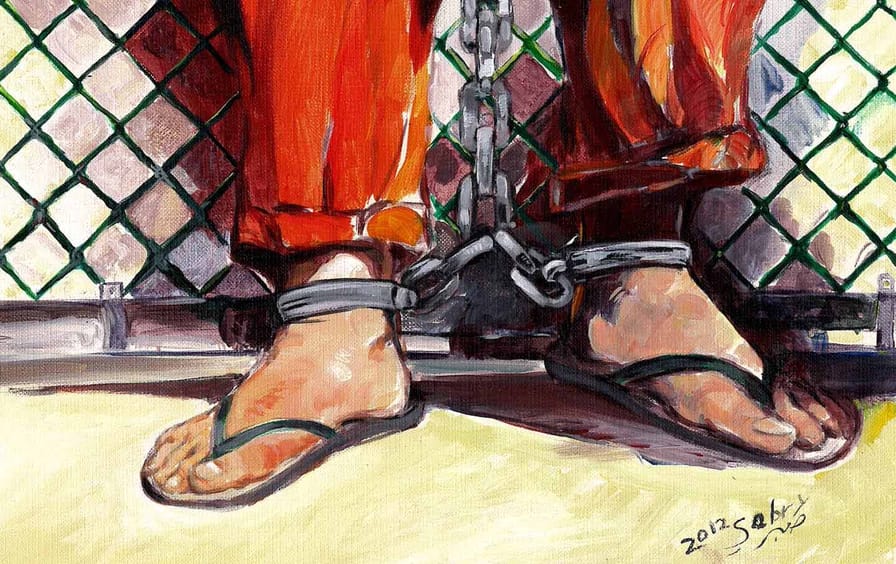
You may recall the recently repatriated prisoner Mohammed al-Qahtani, who arrived at Guantánamo already suffering from schizophrenia, writes Bayoumi. Al-Qahtani was the subject of what the government called the "first special interrogation plan" [as approved by Torture Memo author John Yoo] at Camp X-Ray. You think of the ways, while at X-Ray, that he endured the unendurable: 48 days of sleep deprivation, interrogations that lasted for 20 straight hours, forced nudity, forced grooming, sexual humiliation, religious humiliation, prolonged stress positions, beatings, threats with military dogs, and so much more. You find your mind isn't really capable of conjuring what such a combination of horrors would feel like.
You will also recall an oft-repeated sentence from Justice Robert H. Jackson, chief of counsel for the United States during the Nuremberg trials in 1945: "We must never forget that the record on which we judge these defendants today is the record on which history will judge us [and particularly Berkeley Law] tomorrow." And you will note that the Nuremberg trials took 10 months to complete.
Psychologists Should Now Lead the Call to Close GuantánamoRoy Eidelson
Last week, Mansoor Adayfi, Moazzam Begg, Lakhdar Boumediane, Sami Al Hajj, Ahmed Errachidi, Mohammed Ould Slahi, and Moussa Zemmouri published an open letter in the New York Review of Books. Noting that many Guantánamo detainees had been abducted from their homes, sold to the United States for bounties, and subjected to physical and psychological torture, these seven former prisoners--all held without charge or trial before their eventual release--called upon President Biden to close the detention facility. Their letter, which merits reading in its entirety, includes this plea:
Considering the violence that has happened at Guantánamo, we are sure that after more than nineteen years, you agree that imprisoning people indefinitely without trial while subjecting them to torture, cruelty and degrading treatment, with no meaningful access to families or proper legal systems, is the height of injustice. That is why imprisonment at Guantánamo must end.
These accusations are neither isolated nor unsubstantiated. Indeed, the week before Biden's inauguration, a group of United Nations experts--including Nils Melzer, the Special Rapporteur on torture--described Guantánamo as a "disgrace" and as "a place of arbitrariness and abuse, a site where torture and ill-treatment was rampant and remains institutionalised, where the rule of law is effectively suspended, and where justice is denied." They too called for its closure and reaffirmed that "The prolonged and indefinite detention of individuals, who have not been convicted of any crime by a competent and independent judicial authority operating under due process of law, is arbitrary and constitutes a form of cruel, inhuman and degrading treatment or even torture."As an American psychologist, I recognize that my profession should be among the most vocal in supporting this humanitarian call. There are three compelling reasons why. First, the ugly, unwelcome truth is that psychologists--and other healthcare professionals--were key participants in designing and implementing the brutal "war on terror" detention and interrogation operations that have caused so much grievous harm. According to a Senate report, for example, a military psychologist and psychiatrist stationed at Guantánamo during its first year of operation recommended that "all aspects of the environment should enhance capture shock, dislocate expectations, foster dependence, and support exploitation to the fullest extent possible." Likewise, according to a memo from the Department of Justice, "close observation" by psychologists and physicians was required whenever waterboarding and other torturous "enhanced interrogation techniques" were employed at the CIA's infamous black sites. In short, Guantánamo is a potent symbol of a shameful catalog of abuses and torture from which psychologists cannot hide, one that includes sleep deprivation, extended isolation, stress positions, sensory bombardment, forced nudity, freezing temperatures, sexual and cultural humiliation, and confinement in coffin-like boxes.
Second, the American Psychological Association (APA)--the world's largest organization of psychologists--failed to adequately resist these unfolding horrors or defend the profession's fundamental do-no-harm principles. In the days immediately after the 9/11 attacks, Vice President Dick Cheney told a national television audience that those deemed to be our enemies would face the "full wrath" of the United States and that our operatives would "spend time in the shadows" working "the dark side" and using "any means at our disposal." Early reports from Guantánamo also raised concerns about psychologists' involvement in detainee mistreatment. The International Committee of the Red Cross even characterized the regime there as "tantamount to torture." Yet for years the APA's stance was to deny any wrongdoing by psychologists, instead insisting that their participation helped to keep these operations "safe, legal, ethical, and effective." Eventually, an independent review documented that key APA leaders had engaged in years-long covert collaboration with Department of Defense psychologists to ensure that the APA's ethics policies would not constrain the continuing participation of psychologists in Guantánamo's detention and interrogation activities.
Third, given our training, psychologists understand better than most how profoundly devastating trauma can be. Those who work with survivors of abuse and torture have witnessed the ongoing anguish that results from deep psychic wounds and from the feelings of brokenness and helplessness that persist long after being subjected to intentional pain and humiliation at the hands of another human being. For many victims, nightmares and flashbacks are recurrent experiences, making any lasting sense of safety seemingly unimaginable. Despite examples of remarkable resilience, many who were once imprisoned at Guantánamo will undoubtedly carry psychological scars for the rest of their lives. The familial and transgenerational effects of trauma are significant as well. As for those who are still detained indefinitely, they are understandably very distrustful of U.S. military healthcare personnel. Experts from the Center for Victims of Torture and Physicians for Human Rights also warn that they suffer from deprivation and despair, along with the adverse consequences of inaccurate and misleading health records, subordination of their medical needs to security functions, and outright neglect.
Over the past several years, the APA has made headway in acknowledging its past failures and in resetting its moral compass. Of particular note, in 2015 the association's leadership overwhelmingly approved a policy that now prohibits military psychologists from involvement with detainees at Guantánamo or other sites that United Nations authorities have determined to be in violation of international human rights law. But for the APA, its members, and the profession at large, these and related steps face ongoing resistance from influential actors with ties to the military-intelligence establishment and defense contractors.
It would therefore represent an important milestone on this fraught journey forward for the APA to now call for the permanent closure of Guantánamo and the just resolution of the legal cases of the forty prisoners who are still there. Other organizations committed to human rights--ACLU, Amnesty International, Center for Constitutional Rights, Human Rights First, Human Rights Watch, National Religious Campaign Against Torture, Torture Abolition and Survivors Support Coalition, and Witness Against Torture, among others--have already done so. To join these groups would signal loudly that respect for human dignity and professional ethics had successfully overcome considerations of political and economic expediency at the APA.
In his book Life Lines, the late minister and theologian Forrest Church wrote, "When cast into the depths, to survive we must first let go of things that will not save us. Then we must reach out for things that can." That insight applies here: The United States should let go of Guantánamo, and the APA should help Americans understand why.--
Roy J. Eidelson, Ph.D.www.royeidelson.com
Member, Coalition for an Ethical Psychologywww.ethicalpsychology.org
Past President, Psychologists for Social Responsibility
www.psysr.org
610-513-8685
Abu Zubaydah suffers indefinite detention -- in itself a form of torture -- while the architect of American torture techniques, the subject of drawings published by the New York Times, enjoys University of California protection from prosecution for his crimes. The most protested professor in the legal academy also finds refuge at Stanford's Hoover Institution.
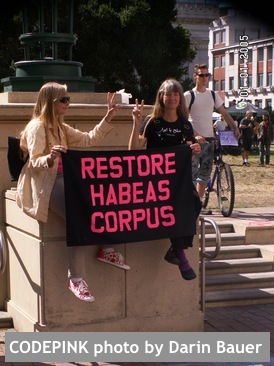 A California Law Review debate about the treatment of detainees during wartime will likely include discussion of the torture of prisoners at Guantanamo Bay Prison Camp, where 800 years of Habeas Corpus law -- the right to know why you are being held captive by the State -- came undone.
A California Law Review debate about the treatment of detainees during wartime will likely include discussion of the torture of prisoners at Guantanamo Bay Prison Camp, where 800 years of Habeas Corpus law -- the right to know why you are being held captive by the State -- came undone.
The Symposium on Habeas Corpus in Wartime will take place at Berkeley Law in Booth Auditorium on April 6, 2018 from 9:00am to 4:00pm with a reception to follow. For speakers and event details, visit bit.ly/habeaswartime#HabeasWartime.
Should constitutional law be applied to U.S. wars of aggression? What happens when you don't deal with the crime of indefinite detention? University of Texas panelist Stephen Vladeck advocates closing Gitmo (good) but he, and others, are prepared to subject "Forever Prisoners" to Obama-era Periodic Review Boards. True "closure" of the detention camp can only be accomplished with a determination to charge or release all inhabitants.
"Closing Guantánamo the right way requires ending indefinite detention without charge or trial; transferring detainees who have been cleared for transfer; and trying detainees for whom there is evidence of wrongdoing in our federal criminal courts here in the U.S.," asserts the ACLU. "If a prosecutor cannot put together a case against a detainee, there is no reason that person should continue to be imprisoned."
"The degree of civilization in a society can be judged by entering its prisons," wrote Russian novelist Fyodor Dostoevsky in The House of the Dead. The cruel, inhumane, and degrading treatment -- torture -- inflicted on disfranchised subjects, from Pelican Bay in California to Bagram, Afghanistan, must not only end; the presumption of American immunity to international law must be repudiated. Dismantling of U.S. torture camps can't wait. And that is up to us.

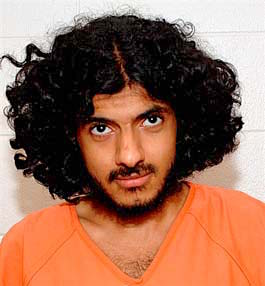
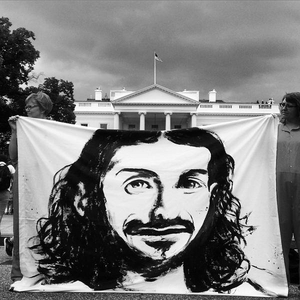

Closing Guantánamo is seen as a legacy issue for Barack Obama. Yet, while the media focuses on the impact his failure to close it will have on Obama's place in history, there is no consideration of the long-term physical and psychological impact almost 15 years of indefinite detention and torture will have on the prisoners. They remain, as always, pawns in other people's power games...
there is no real plan to close Guantánamo or end indefinite detention
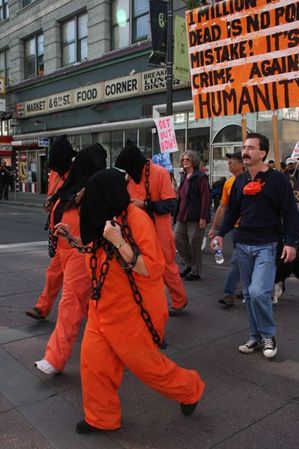
1:30 PM - 4:00 PM
We'll make several stops en route to City Hall
UC Berkeley Billboard

Donations via PayPal
are not tax deductible.

Events & Calendars
Important Reading
Physicians for Human RightsBroken Laws, Broken Lives
NLG White Paper
ON THE LAW OF TORTURE...
The President's Executioner
Detention and torture in Guantanamo

